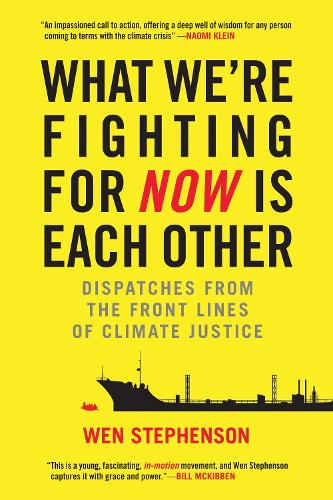
What We're Fighting for Now Is Each Other: Dispatches from the Front Lines of Climate Justice
(Paperback)
Publishing Details
What We're Fighting for Now Is Each Other: Dispatches from the Front Lines of Climate Justice
By (Author) Wen Stephenson
Beacon Press
Beacon Press
1st September 2018
18th October 2016
United States
Classifications
General
Non Fiction
363.73874
Physical Properties
Paperback
256
Width 153mm, Height 229mm, Spine 16mm
346g
Description
An urgent, on-the-ground look at some of the "new American radicals" who have laid everything on the line to build a stronger climate justice movement The science is clear- catastrophic climate change, by any humane definition, is upon us. At the same time, the fossil-fuel industry has doubled down, economically and politically, on business as usual. We face an unprecedented situation-a radical situation. As an individual of conscience, how will you respond In 2010, journalist Wen Stephenson woke up to the true scale and urgency of the catastrophe bearing down on humanity, starting with the poorest and most vulnerable everywhere, and confronted what he calls "the spiritual crisis at the heart of the climate crisis." Inspired by others who refused to retreat into various forms of denial and fatalism, he walked away from his career in mainstream media and became an activist, joining those working to build a transformative movement for climate justice in America. In What We're Fighting for Now Is Each Other, Stephenson tells his own story and offers an up-close, on-the-ground look at some of the remarkable and courageous people-those he calls "new American radicals"-who have laid everything on the line to build and inspire this fast-growing movement- old-school environmentalists and young climate-justice organizers, frontline community leaders and Texas tar-sands blockaders, Quakers and college students, evangelicals and Occupiers. Most important, Stephenson pushes beyond easy labels to understand who these people really are, what drives them, and what they're ultimately fighting for. He argues that the movement is less like environmentalism as we know it and more like the great human-rights and social-justice struggles of the nineteenth and twentieth centuries, from abolitionism to civil rights. It's a movement for human solidarity. This is a fiercely urgent and profoundly spiritual journey into the climate-justice movement at a critical moment-in search of what climate justice, at this late hour, might yet mean.
Reviews
Impassioned, provocative, beautifully written.
Mark Hertsgaard, Daily Beast
In this harrowing, compelling call to action, Stephenson argues for radicalism, for a moral and even spiritual awakening similar to what fueled 19th century abolitionism.
Kate Tuttle, Boston Globe
Thoughtful and self-aware...Stephenson grapples with the existential threat of environmental catastrophe by turning his gaze outward, onto the foot soldiers of the young and growing climate justice movement.
Chris Bentley, Chicago Tribune
At its heart, this book is about a transformative social movement that is desperately needed and might just already be here.
Caroline Selle, Orion
Readers will feel that theyve traveled along with Stephenson and will likely be as transformed as he was as they think about what they might contribute to the environmental movement.
Booklist
What Were Fighting For Now Is Each Other is impassioned, provocative, beautifully written...The great value of the book, as well as its great risk, is that it forces each of us to ask: what am I doing about the train thats barreling down the tracks towards me, my loved ones, and all we hold dear
The Daily Beast
Wen Stephenson has written nothing less than a love letter to the student organizers, preachers, and frontline fighters struggling for climate justice across the United States. Together, these portraits coalesce into an impassioned call to action, offering a deep well of wisdom for any person coming to terms with the climate crisis.
Naomi Klein, author ofThis Changes EverythingandThe Shock Doctrine
In this powerful treatise, Wen Stephenson chronicles the convergence of climate activism and human rights struggles in frontline communities viewed through a climate justice lens.He convincingly presents climate change as the definitive global environmental justice issue of our day.
Robert D. Bullard, author of Dumping in Dixie and co-author of The Wrong Complexion for Protection
To take the climate crisis seriously is to take it personally, to let it shake your soul. Wen Stephenson has done that, in a book that beautifully intertwines his own story with the stories of other Americans who encounter the endangered world with the better angels of their nature. This is a profound, soul-stirring exploration by a twenty-first century abolitionist who, when he warns that its too late, means that its not too late.
Todd Gitlin, author ofThe SixtiesandOccupy Nation
In this lucid, compelling and deeply moving book, Wen Stephenson invites the reader to confront the same stark question that he himself had to confront: given the climate crisis now unfolding around me, what are my sources of hope and what shall I do with the time Ive been given This marvelous book charts a path to social and political transformation that springs from a spiritual awakening to the power of love.
Rev. Margaret Bullitt-Jonas, Ph.D., Missioner for Creation Care, Episcopal Diocese of Western Massachusetts
It has been often said that the fight against climate disruption needs stories and heroes to bring the struggle to life. Well, look no further than Wen Stephensons What Were Fighting for Now is Each Other. This glorious, moving telling creates a narrative that can inspire a movement for deep change before it is too late.
James Gustave Speth, author of America the Possible: Manifesto for a New Economy
This is a young, fascinating, in-motionmovement, and Wen Stephenson captures it with grace and power. I learned a good deal about things I thought I already understood.
Bill McKibben, co-founder 350.org
Author Bio
Wen Stephenson, an independent journalist and climate activist, is a contributing writer for the Nation. Formerly an editor at the Atlantic and the Boston Globe, he has also written about climate, culture, and politics for Slate, the New York Times, Grist, and the Boston Phoenix.
